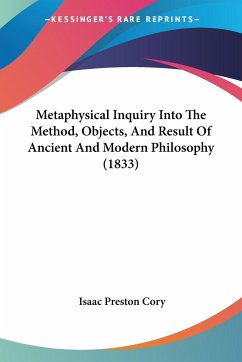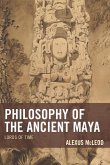- Broschiertes Buch
- Merkliste
- Auf die Merkliste
- Bewerten Bewerten
- Teilen
- Produkt teilen
- Produkterinnerung
- Produkterinnerung
Philosophy in the Ancient World: An Introduction_an intellectual history of the ancient world from the eighth century B.C.E. to the fifth century C.E., from Homer to Boethius_describes and evaluates ancient thought in its cultural setting, showing how it affected and was affected by that setting. The greatest philosophers (Parmenides, Plato, Aristotle, Augustine) and cultural figures (Homer, Euripides, Thucydides, Archimedes) and a number of lesser ones (Hesiod, Posidonius, Basil) receive careful description and evaluation. Philosophy in the Ancient World is ideally suited as a supplement for…mehr
Andere Kunden interessierten sich auch für
![The Aporetic Tradition in Ancient Philosophy The Aporetic Tradition in Ancient Philosophy]() The Aporetic Tradition in Ancient Philosophy34,99 €
The Aporetic Tradition in Ancient Philosophy34,99 €![The Ancient Quarrel Between Philosophy and Poetry The Ancient Quarrel Between Philosophy and Poetry]() Raymond BarfieldThe Ancient Quarrel Between Philosophy and Poetry47,99 €
Raymond BarfieldThe Ancient Quarrel Between Philosophy and Poetry47,99 €![The Political Theories Of The Ancient World (1903) The Political Theories Of The Ancient World (1903)]() Westel Woodbury WilloughbyThe Political Theories Of The Ancient World (1903)31,99 €
Westel Woodbury WilloughbyThe Political Theories Of The Ancient World (1903)31,99 €![Metaphysical Inquiry Into The Method, Objects, And Result Of Ancient And Modern Philosophy (1833) Metaphysical Inquiry Into The Method, Objects, And Result Of Ancient And Modern Philosophy (1833)]() Isaac Preston CoryMetaphysical Inquiry Into The Method, Objects, And Result Of Ancient And Modern Philosophy (1833)41,99 €
Isaac Preston CoryMetaphysical Inquiry Into The Method, Objects, And Result Of Ancient And Modern Philosophy (1833)41,99 €![Cosmos in the Ancient World Cosmos in the Ancient World]() Cosmos in the Ancient World40,99 €
Cosmos in the Ancient World40,99 €![Philosophy of the Ancient Maya Philosophy of the Ancient Maya]() Alexus McleodPhilosophy of the Ancient Maya57,99 €
Alexus McleodPhilosophy of the Ancient Maya57,99 €![A Critical Inquiry Into The Opinions And Practice Of The Ancient Philosophers A Critical Inquiry Into The Opinions And Practice Of The Ancient Philosophers]() John TowneA Critical Inquiry Into The Opinions And Practice Of The Ancient Philosophers32,99 €
John TowneA Critical Inquiry Into The Opinions And Practice Of The Ancient Philosophers32,99 €-
-
-
Philosophy in the Ancient World: An Introduction_an intellectual history of the ancient world from the eighth century B.C.E. to the fifth century C.E., from Homer to Boethius_describes and evaluates ancient thought in its cultural setting, showing how it affected and was affected by that setting. The greatest philosophers (Parmenides, Plato, Aristotle, Augustine) and cultural figures (Homer, Euripides, Thucydides, Archimedes) and a number of lesser ones (Hesiod, Posidonius, Basil) receive careful description and evaluation. Philosophy in the Ancient World is ideally suited as a supplement for undergraduate courses in Ancient Philosophy and the History of Philosophy in the West.
Hinweis: Dieser Artikel kann nur an eine deutsche Lieferadresse ausgeliefert werden.
Hinweis: Dieser Artikel kann nur an eine deutsche Lieferadresse ausgeliefert werden.
Produktdetails
- Produktdetails
- Verlag: Rowman & Littlefield Publishers
- Seitenzahl: 414
- Erscheinungstermin: 18. Februar 2005
- Englisch
- Abmessung: 254mm x 178mm x 22mm
- Gewicht: 775g
- ISBN-13: 9780742533295
- ISBN-10: 0742533298
- Artikelnr.: 22177896
- Herstellerkennzeichnung
- Libri GmbH
- Europaallee 1
- 36244 Bad Hersfeld
- gpsr@libri.de
- Verlag: Rowman & Littlefield Publishers
- Seitenzahl: 414
- Erscheinungstermin: 18. Februar 2005
- Englisch
- Abmessung: 254mm x 178mm x 22mm
- Gewicht: 775g
- ISBN-13: 9780742533295
- ISBN-10: 0742533298
- Artikelnr.: 22177896
- Herstellerkennzeichnung
- Libri GmbH
- Europaallee 1
- 36244 Bad Hersfeld
- gpsr@libri.de
By James A. Arieti - Other David M. Gibson
Chapter 1 Illustrations Chapter 2 Preface Chapter 3 Acknowledgements
Chapter 4 Time Line of the Ancient Thinkers Chapter 5 Map: Philosophers in
the Ancient World Part 6 Chapter 1: A World Ready for Philosophy Chapter 7
I. Why Ancient Philosophy Chapter 8 II. Qualities of the Greek Mind
Conducive to Philosophy Chapter 9 III. Before Philosophy: Homer and Hesiod
Chapter 10 A. Homer Chapter 11 B. Hesiod Chapter 12 IV. Why Homer and
Hesiod Are Not Philosophy Chapter 13 V. Other Conditions Affecting the
Birth of Philosophy Chapter 14 A. The Polis Chapter 15 B. Architecture and
Art Chapter 16 VI. How and Where Philosophy Began Chapter 17 VII. The
Branches of Philosophy Part 20 Chapter 2: Philosophy Begins Chapter 21 I.
By What Name Shall We Call the Milesian Thinkers? Chapter 22 II. How Do We
Know About the Early Thinkers? Chapter 23 III. The Thinkers from Miletus:
Thales, Anaximander, Anaximenes Chapter 24 A. Thales (624-546) Chapter 25
B. Anaximander (610-546) Chapter 26 C. Anaximenes (585-528) Chapter 26
Discussion Questions Chapter 27 Select Bibliography Chapter 27 IV. General
Remarks on the Milesians Part 30 Chapter 3: Philosophy Moves to Italy
Chapter 31 I. Italy Chapter 32 Discussion Questions Chapter 32 II.
Pythagoras Chapter 33 Select Bibliography Chapter 33 III. Xenophanes Part
36 Chapter 4: The Turn of the Fifth Century: Heraclitus and Parmenides
Chapter 37 I. The Turn of the Century Chapter 38 II. Heraclitus Chapter 39
III. Parmenides (fl. 501-490) and His Successors Chapter 40 Discussion
Questions Chapter 40 A. Parmenides Chapter 41 B. Zeno and Melissus Chapter
41 Select Bibliography Part 44 Chapter 5: The Persian Wars and their
Aftermath: Sophistry and Rhetoric Chapter 45 Discussion Questions Chapter
45 I. The Persian Wars Chapter 46 Select Bibliography Chapter 46 II.
Rhetoric and Sophistry Part 49 Chapter 6: Medicine, Tragedy, History
Chapter 50 I. Medicine Chapter 51 Discussion Questions Chapter 51 II.
Tragedy Chapter 52 III. History Chapter 52 Select Bibliography Part 55
Chapter 7: Empedocles, Anaxagoras, and Democritus Chapter 56 I. Empedocles
Chapter 57 II. Anaxagoras Chapter 58 Discussion Questions Chapter 58 III.
Democritus Chapter 59 IV. Summing up the Early Philosophers Chapter 59
Select Bibliography Part 62 Chapter 8: The Peloponnesian War: Socrates,
Thucydides, Euripides Chapter 63 I. Socrates Chapter 64 II. Thucydides
Chapter 64 Discussion Questions Chapter 65 Select Bibliography Chapter 65
III. Euripides Part 68 Chapter 9: Rhetoric and the Philosophers Chapter 69
I. Rhetoric Chapter 70 II. Extemporaneous and Prepared Speeches Chapter 71
III. Isocrates (436-338) Chapter 72 III. Rhetoric and Philosophy Part 75
Chapter 10: Plato Chapter 76 I. Plato (428-348 B.C.E.) Chapter 77 II.
Reading Platonic Dialogues Chapter 78 III. A Compendium of Views Associated
with Plato Chapter 79 A. Metaphysics Chapter 80 B. Ethics Chapter 81 C.
Political Philosophy Chapter 82 D. Eros Chapter 83 E. Teleology Chapter 84
F. Other Views Chapter 85 IV. Plato's Academy Chapter 85 Discussion
Questions Chapter 86 V. After Plato Chapter 86 Select Bibliography Part 89
Chapter 11: Aristotle Chapter 91 II. Logic Chapter 92 III. Aristotle's Ten
Categories Chapter 93 A. The Ten Types of Predication Chapter 94 B. Matter
and Form Chapter 95 C. Actuality and Potentiality Chapter 96 D. Essence
Chapter 97 E. Additional Thoughts on Actuality and Potentiality Chapter 98
IV. Aristotle's "Four Causes" Chapter 99 V. Aristotle's Response to
Parmenides Chapter 100 VI. The Prime Mover as Aristotle's Deity Chapter 101
VII. Aristotle's Philosophy of Science Chapter 102 A. The Strong Meaning of
Knowledge Chapter 103 B. Where Knowledge Comes From Chapter 104 C. Mistakes
People Make About Knowledge Chapter 105 D. Unqualified Knowledge Chapter
106 VIII. Aristotle's Ethics Chapter 107 A. Happiness Chapter 108 B. The
Doctrine of the Mean and the Virtues Chapter 109 C. Friendship Chapter 110
D. Pleasure Chapter 111 Discussion Questions Chapter 111 IX. Aristotle's
Psychology Chapter 112 Select Bibliography Chapter 112 X. Aristotle's
Legacy Part 115 Chapter 12: The World of The Third Century Chapter 116 I.
Alexander and his Aftermath Chapter 117 II. Intellectual Developments
Chapter 118 A. Mathematics and Astronomy Chapter 119 B. Biological Sciences
Chapter 120 C. City-planning Chapter 120 Discussion Questions Chapter 121
D. Literary Studies Chapter 121 Select Bibliography Part 124 Chapter 13:
Epicureanism Chapter 125 I. Introduction Chapter 126 II. Epicurus's
Antecedents Chapter 127 A. Aristippus of Cyrene (435-360) Chapter 128 B.
Pyrrho of Elis (c. 360-275) Chapter 129 III. Epicureanism Chapter 130 A.
Epicurus Chapter 130 Discussion Questions Chapter 131 B. Epicurus's System
Chapter 131 Select Bibliography Chapter 133 I. Introduction Part 134
Chapter 14: Stoicism Chapter 135 I. Introduction Chapter 136 II. Cynics
Chapter 137 III. The Early Stoa Chapter 138 A. The Founding of Stoicism:
Zeno (336-265) Chapter 139 B. Zeno's Successors Chapter 140 C. The Middle
Stoa Chapter 141 IV. Tenets of Stoicism Chapter 142 A. Introduction Chapter
143 B. Logic Chapter 144 C. Stoic Physics and Its Relation to Ethics
Chapter 145 D. Ethics Chapter 146 E. Assorted Stoic Views Chapter 147 V.
Roman Stoicism Chapter 148 A. Seneca (4 B.C.E.-65 C.E.) Chapter 149 B.
Epictetus (55-135) Chapter 150 C. Marcus Aurelius (121-180) Chapter 150
Discussion Questions Chapter 151 VI. Concluding Remarks on Stoicism Chapter
151 Select Bibliography Part 154 Chapter 15: Rome and Cicero Chapter 155 I.
Rome Chapter 156 II. Cicero the Man Chapter 157 III. Cicero the Thinker
Chapter 157 Discussion Questions Chapter 158 IV. Cicero's Legacy Chapter
158 Select Bibliography Part 159 Chapter 16: Greek Philosophy Finds the
Bible and the Bible Finds Greek Philosophy Chapter 162 Discussion Questions
Chapter 162 I. The World at the Turn of the Millennium Chapter 163 Select
Bibliography Chapter 163 II. Philo of Alexandria Part 166 Chapter 17: The
War for the Ancient Soul Chapter 167 I. The War of Politics and Philosophy
Chapter 168 II. Cultural Decline and Its Explanations Chapter 169 III. The
City on a Hill Chapter 170 IV. Christianity and Philosophy Chapter 171 V.
The Christian Dance with Philosophy: Minucius Felix and Basil of Caesarea
Chapter 172 A. Minucius Felix (fl. 200-240) Chapter 172 Discussion
Questions Chapter 173 B. Basil of Caesarea (330-379) Chapter 173 Select
Bibliography Chapter 174 Discussion Questions Chapter 175 Select
Bibliography Part 176 Chapter 18: Philosophy at the End of Antiquity
Chapter 177 I. Neoplatonism Chapter 178 II. Plotinus (205-270) Chapter 179
III. Christian Philosophy Chapter 180 IV. Augustine (354-430) Chapter 181
A. Augustine's Conversion to Philosophy Chapter 182 B. Augustine's
Manichaean Period Chapter 183 C. Augustine's Neoplatonist Period Chapter
184 D. Augustine's Christian Philosophy Chapter 185 E. Conclusions about
Augustine Chapter 186 V. Boethius (475-524) Chapter 187 Discussion
Questions Chapter 187 VI. Heresy and the End of Ancient Philosophy Chapter
188 Select Bibliography Chapter 188 VII. Concluding Remarks Chapter 189
Discussion Questions Chapter 190 Select Bibliography
Chapter 4 Time Line of the Ancient Thinkers Chapter 5 Map: Philosophers in
the Ancient World Part 6 Chapter 1: A World Ready for Philosophy Chapter 7
I. Why Ancient Philosophy Chapter 8 II. Qualities of the Greek Mind
Conducive to Philosophy Chapter 9 III. Before Philosophy: Homer and Hesiod
Chapter 10 A. Homer Chapter 11 B. Hesiod Chapter 12 IV. Why Homer and
Hesiod Are Not Philosophy Chapter 13 V. Other Conditions Affecting the
Birth of Philosophy Chapter 14 A. The Polis Chapter 15 B. Architecture and
Art Chapter 16 VI. How and Where Philosophy Began Chapter 17 VII. The
Branches of Philosophy Part 20 Chapter 2: Philosophy Begins Chapter 21 I.
By What Name Shall We Call the Milesian Thinkers? Chapter 22 II. How Do We
Know About the Early Thinkers? Chapter 23 III. The Thinkers from Miletus:
Thales, Anaximander, Anaximenes Chapter 24 A. Thales (624-546) Chapter 25
B. Anaximander (610-546) Chapter 26 C. Anaximenes (585-528) Chapter 26
Discussion Questions Chapter 27 Select Bibliography Chapter 27 IV. General
Remarks on the Milesians Part 30 Chapter 3: Philosophy Moves to Italy
Chapter 31 I. Italy Chapter 32 Discussion Questions Chapter 32 II.
Pythagoras Chapter 33 Select Bibliography Chapter 33 III. Xenophanes Part
36 Chapter 4: The Turn of the Fifth Century: Heraclitus and Parmenides
Chapter 37 I. The Turn of the Century Chapter 38 II. Heraclitus Chapter 39
III. Parmenides (fl. 501-490) and His Successors Chapter 40 Discussion
Questions Chapter 40 A. Parmenides Chapter 41 B. Zeno and Melissus Chapter
41 Select Bibliography Part 44 Chapter 5: The Persian Wars and their
Aftermath: Sophistry and Rhetoric Chapter 45 Discussion Questions Chapter
45 I. The Persian Wars Chapter 46 Select Bibliography Chapter 46 II.
Rhetoric and Sophistry Part 49 Chapter 6: Medicine, Tragedy, History
Chapter 50 I. Medicine Chapter 51 Discussion Questions Chapter 51 II.
Tragedy Chapter 52 III. History Chapter 52 Select Bibliography Part 55
Chapter 7: Empedocles, Anaxagoras, and Democritus Chapter 56 I. Empedocles
Chapter 57 II. Anaxagoras Chapter 58 Discussion Questions Chapter 58 III.
Democritus Chapter 59 IV. Summing up the Early Philosophers Chapter 59
Select Bibliography Part 62 Chapter 8: The Peloponnesian War: Socrates,
Thucydides, Euripides Chapter 63 I. Socrates Chapter 64 II. Thucydides
Chapter 64 Discussion Questions Chapter 65 Select Bibliography Chapter 65
III. Euripides Part 68 Chapter 9: Rhetoric and the Philosophers Chapter 69
I. Rhetoric Chapter 70 II. Extemporaneous and Prepared Speeches Chapter 71
III. Isocrates (436-338) Chapter 72 III. Rhetoric and Philosophy Part 75
Chapter 10: Plato Chapter 76 I. Plato (428-348 B.C.E.) Chapter 77 II.
Reading Platonic Dialogues Chapter 78 III. A Compendium of Views Associated
with Plato Chapter 79 A. Metaphysics Chapter 80 B. Ethics Chapter 81 C.
Political Philosophy Chapter 82 D. Eros Chapter 83 E. Teleology Chapter 84
F. Other Views Chapter 85 IV. Plato's Academy Chapter 85 Discussion
Questions Chapter 86 V. After Plato Chapter 86 Select Bibliography Part 89
Chapter 11: Aristotle Chapter 91 II. Logic Chapter 92 III. Aristotle's Ten
Categories Chapter 93 A. The Ten Types of Predication Chapter 94 B. Matter
and Form Chapter 95 C. Actuality and Potentiality Chapter 96 D. Essence
Chapter 97 E. Additional Thoughts on Actuality and Potentiality Chapter 98
IV. Aristotle's "Four Causes" Chapter 99 V. Aristotle's Response to
Parmenides Chapter 100 VI. The Prime Mover as Aristotle's Deity Chapter 101
VII. Aristotle's Philosophy of Science Chapter 102 A. The Strong Meaning of
Knowledge Chapter 103 B. Where Knowledge Comes From Chapter 104 C. Mistakes
People Make About Knowledge Chapter 105 D. Unqualified Knowledge Chapter
106 VIII. Aristotle's Ethics Chapter 107 A. Happiness Chapter 108 B. The
Doctrine of the Mean and the Virtues Chapter 109 C. Friendship Chapter 110
D. Pleasure Chapter 111 Discussion Questions Chapter 111 IX. Aristotle's
Psychology Chapter 112 Select Bibliography Chapter 112 X. Aristotle's
Legacy Part 115 Chapter 12: The World of The Third Century Chapter 116 I.
Alexander and his Aftermath Chapter 117 II. Intellectual Developments
Chapter 118 A. Mathematics and Astronomy Chapter 119 B. Biological Sciences
Chapter 120 C. City-planning Chapter 120 Discussion Questions Chapter 121
D. Literary Studies Chapter 121 Select Bibliography Part 124 Chapter 13:
Epicureanism Chapter 125 I. Introduction Chapter 126 II. Epicurus's
Antecedents Chapter 127 A. Aristippus of Cyrene (435-360) Chapter 128 B.
Pyrrho of Elis (c. 360-275) Chapter 129 III. Epicureanism Chapter 130 A.
Epicurus Chapter 130 Discussion Questions Chapter 131 B. Epicurus's System
Chapter 131 Select Bibliography Chapter 133 I. Introduction Part 134
Chapter 14: Stoicism Chapter 135 I. Introduction Chapter 136 II. Cynics
Chapter 137 III. The Early Stoa Chapter 138 A. The Founding of Stoicism:
Zeno (336-265) Chapter 139 B. Zeno's Successors Chapter 140 C. The Middle
Stoa Chapter 141 IV. Tenets of Stoicism Chapter 142 A. Introduction Chapter
143 B. Logic Chapter 144 C. Stoic Physics and Its Relation to Ethics
Chapter 145 D. Ethics Chapter 146 E. Assorted Stoic Views Chapter 147 V.
Roman Stoicism Chapter 148 A. Seneca (4 B.C.E.-65 C.E.) Chapter 149 B.
Epictetus (55-135) Chapter 150 C. Marcus Aurelius (121-180) Chapter 150
Discussion Questions Chapter 151 VI. Concluding Remarks on Stoicism Chapter
151 Select Bibliography Part 154 Chapter 15: Rome and Cicero Chapter 155 I.
Rome Chapter 156 II. Cicero the Man Chapter 157 III. Cicero the Thinker
Chapter 157 Discussion Questions Chapter 158 IV. Cicero's Legacy Chapter
158 Select Bibliography Part 159 Chapter 16: Greek Philosophy Finds the
Bible and the Bible Finds Greek Philosophy Chapter 162 Discussion Questions
Chapter 162 I. The World at the Turn of the Millennium Chapter 163 Select
Bibliography Chapter 163 II. Philo of Alexandria Part 166 Chapter 17: The
War for the Ancient Soul Chapter 167 I. The War of Politics and Philosophy
Chapter 168 II. Cultural Decline and Its Explanations Chapter 169 III. The
City on a Hill Chapter 170 IV. Christianity and Philosophy Chapter 171 V.
The Christian Dance with Philosophy: Minucius Felix and Basil of Caesarea
Chapter 172 A. Minucius Felix (fl. 200-240) Chapter 172 Discussion
Questions Chapter 173 B. Basil of Caesarea (330-379) Chapter 173 Select
Bibliography Chapter 174 Discussion Questions Chapter 175 Select
Bibliography Part 176 Chapter 18: Philosophy at the End of Antiquity
Chapter 177 I. Neoplatonism Chapter 178 II. Plotinus (205-270) Chapter 179
III. Christian Philosophy Chapter 180 IV. Augustine (354-430) Chapter 181
A. Augustine's Conversion to Philosophy Chapter 182 B. Augustine's
Manichaean Period Chapter 183 C. Augustine's Neoplatonist Period Chapter
184 D. Augustine's Christian Philosophy Chapter 185 E. Conclusions about
Augustine Chapter 186 V. Boethius (475-524) Chapter 187 Discussion
Questions Chapter 187 VI. Heresy and the End of Ancient Philosophy Chapter
188 Select Bibliography Chapter 188 VII. Concluding Remarks Chapter 189
Discussion Questions Chapter 190 Select Bibliography
Chapter 1 Illustrations Chapter 2 Preface Chapter 3 Acknowledgements
Chapter 4 Time Line of the Ancient Thinkers Chapter 5 Map: Philosophers in
the Ancient World Part 6 Chapter 1: A World Ready for Philosophy Chapter 7
I. Why Ancient Philosophy Chapter 8 II. Qualities of the Greek Mind
Conducive to Philosophy Chapter 9 III. Before Philosophy: Homer and Hesiod
Chapter 10 A. Homer Chapter 11 B. Hesiod Chapter 12 IV. Why Homer and
Hesiod Are Not Philosophy Chapter 13 V. Other Conditions Affecting the
Birth of Philosophy Chapter 14 A. The Polis Chapter 15 B. Architecture and
Art Chapter 16 VI. How and Where Philosophy Began Chapter 17 VII. The
Branches of Philosophy Part 20 Chapter 2: Philosophy Begins Chapter 21 I.
By What Name Shall We Call the Milesian Thinkers? Chapter 22 II. How Do We
Know About the Early Thinkers? Chapter 23 III. The Thinkers from Miletus:
Thales, Anaximander, Anaximenes Chapter 24 A. Thales (624-546) Chapter 25
B. Anaximander (610-546) Chapter 26 C. Anaximenes (585-528) Chapter 26
Discussion Questions Chapter 27 Select Bibliography Chapter 27 IV. General
Remarks on the Milesians Part 30 Chapter 3: Philosophy Moves to Italy
Chapter 31 I. Italy Chapter 32 Discussion Questions Chapter 32 II.
Pythagoras Chapter 33 Select Bibliography Chapter 33 III. Xenophanes Part
36 Chapter 4: The Turn of the Fifth Century: Heraclitus and Parmenides
Chapter 37 I. The Turn of the Century Chapter 38 II. Heraclitus Chapter 39
III. Parmenides (fl. 501-490) and His Successors Chapter 40 Discussion
Questions Chapter 40 A. Parmenides Chapter 41 B. Zeno and Melissus Chapter
41 Select Bibliography Part 44 Chapter 5: The Persian Wars and their
Aftermath: Sophistry and Rhetoric Chapter 45 Discussion Questions Chapter
45 I. The Persian Wars Chapter 46 Select Bibliography Chapter 46 II.
Rhetoric and Sophistry Part 49 Chapter 6: Medicine, Tragedy, History
Chapter 50 I. Medicine Chapter 51 Discussion Questions Chapter 51 II.
Tragedy Chapter 52 III. History Chapter 52 Select Bibliography Part 55
Chapter 7: Empedocles, Anaxagoras, and Democritus Chapter 56 I. Empedocles
Chapter 57 II. Anaxagoras Chapter 58 Discussion Questions Chapter 58 III.
Democritus Chapter 59 IV. Summing up the Early Philosophers Chapter 59
Select Bibliography Part 62 Chapter 8: The Peloponnesian War: Socrates,
Thucydides, Euripides Chapter 63 I. Socrates Chapter 64 II. Thucydides
Chapter 64 Discussion Questions Chapter 65 Select Bibliography Chapter 65
III. Euripides Part 68 Chapter 9: Rhetoric and the Philosophers Chapter 69
I. Rhetoric Chapter 70 II. Extemporaneous and Prepared Speeches Chapter 71
III. Isocrates (436-338) Chapter 72 III. Rhetoric and Philosophy Part 75
Chapter 10: Plato Chapter 76 I. Plato (428-348 B.C.E.) Chapter 77 II.
Reading Platonic Dialogues Chapter 78 III. A Compendium of Views Associated
with Plato Chapter 79 A. Metaphysics Chapter 80 B. Ethics Chapter 81 C.
Political Philosophy Chapter 82 D. Eros Chapter 83 E. Teleology Chapter 84
F. Other Views Chapter 85 IV. Plato's Academy Chapter 85 Discussion
Questions Chapter 86 V. After Plato Chapter 86 Select Bibliography Part 89
Chapter 11: Aristotle Chapter 91 II. Logic Chapter 92 III. Aristotle's Ten
Categories Chapter 93 A. The Ten Types of Predication Chapter 94 B. Matter
and Form Chapter 95 C. Actuality and Potentiality Chapter 96 D. Essence
Chapter 97 E. Additional Thoughts on Actuality and Potentiality Chapter 98
IV. Aristotle's "Four Causes" Chapter 99 V. Aristotle's Response to
Parmenides Chapter 100 VI. The Prime Mover as Aristotle's Deity Chapter 101
VII. Aristotle's Philosophy of Science Chapter 102 A. The Strong Meaning of
Knowledge Chapter 103 B. Where Knowledge Comes From Chapter 104 C. Mistakes
People Make About Knowledge Chapter 105 D. Unqualified Knowledge Chapter
106 VIII. Aristotle's Ethics Chapter 107 A. Happiness Chapter 108 B. The
Doctrine of the Mean and the Virtues Chapter 109 C. Friendship Chapter 110
D. Pleasure Chapter 111 Discussion Questions Chapter 111 IX. Aristotle's
Psychology Chapter 112 Select Bibliography Chapter 112 X. Aristotle's
Legacy Part 115 Chapter 12: The World of The Third Century Chapter 116 I.
Alexander and his Aftermath Chapter 117 II. Intellectual Developments
Chapter 118 A. Mathematics and Astronomy Chapter 119 B. Biological Sciences
Chapter 120 C. City-planning Chapter 120 Discussion Questions Chapter 121
D. Literary Studies Chapter 121 Select Bibliography Part 124 Chapter 13:
Epicureanism Chapter 125 I. Introduction Chapter 126 II. Epicurus's
Antecedents Chapter 127 A. Aristippus of Cyrene (435-360) Chapter 128 B.
Pyrrho of Elis (c. 360-275) Chapter 129 III. Epicureanism Chapter 130 A.
Epicurus Chapter 130 Discussion Questions Chapter 131 B. Epicurus's System
Chapter 131 Select Bibliography Chapter 133 I. Introduction Part 134
Chapter 14: Stoicism Chapter 135 I. Introduction Chapter 136 II. Cynics
Chapter 137 III. The Early Stoa Chapter 138 A. The Founding of Stoicism:
Zeno (336-265) Chapter 139 B. Zeno's Successors Chapter 140 C. The Middle
Stoa Chapter 141 IV. Tenets of Stoicism Chapter 142 A. Introduction Chapter
143 B. Logic Chapter 144 C. Stoic Physics and Its Relation to Ethics
Chapter 145 D. Ethics Chapter 146 E. Assorted Stoic Views Chapter 147 V.
Roman Stoicism Chapter 148 A. Seneca (4 B.C.E.-65 C.E.) Chapter 149 B.
Epictetus (55-135) Chapter 150 C. Marcus Aurelius (121-180) Chapter 150
Discussion Questions Chapter 151 VI. Concluding Remarks on Stoicism Chapter
151 Select Bibliography Part 154 Chapter 15: Rome and Cicero Chapter 155 I.
Rome Chapter 156 II. Cicero the Man Chapter 157 III. Cicero the Thinker
Chapter 157 Discussion Questions Chapter 158 IV. Cicero's Legacy Chapter
158 Select Bibliography Part 159 Chapter 16: Greek Philosophy Finds the
Bible and the Bible Finds Greek Philosophy Chapter 162 Discussion Questions
Chapter 162 I. The World at the Turn of the Millennium Chapter 163 Select
Bibliography Chapter 163 II. Philo of Alexandria Part 166 Chapter 17: The
War for the Ancient Soul Chapter 167 I. The War of Politics and Philosophy
Chapter 168 II. Cultural Decline and Its Explanations Chapter 169 III. The
City on a Hill Chapter 170 IV. Christianity and Philosophy Chapter 171 V.
The Christian Dance with Philosophy: Minucius Felix and Basil of Caesarea
Chapter 172 A. Minucius Felix (fl. 200-240) Chapter 172 Discussion
Questions Chapter 173 B. Basil of Caesarea (330-379) Chapter 173 Select
Bibliography Chapter 174 Discussion Questions Chapter 175 Select
Bibliography Part 176 Chapter 18: Philosophy at the End of Antiquity
Chapter 177 I. Neoplatonism Chapter 178 II. Plotinus (205-270) Chapter 179
III. Christian Philosophy Chapter 180 IV. Augustine (354-430) Chapter 181
A. Augustine's Conversion to Philosophy Chapter 182 B. Augustine's
Manichaean Period Chapter 183 C. Augustine's Neoplatonist Period Chapter
184 D. Augustine's Christian Philosophy Chapter 185 E. Conclusions about
Augustine Chapter 186 V. Boethius (475-524) Chapter 187 Discussion
Questions Chapter 187 VI. Heresy and the End of Ancient Philosophy Chapter
188 Select Bibliography Chapter 188 VII. Concluding Remarks Chapter 189
Discussion Questions Chapter 190 Select Bibliography
Chapter 4 Time Line of the Ancient Thinkers Chapter 5 Map: Philosophers in
the Ancient World Part 6 Chapter 1: A World Ready for Philosophy Chapter 7
I. Why Ancient Philosophy Chapter 8 II. Qualities of the Greek Mind
Conducive to Philosophy Chapter 9 III. Before Philosophy: Homer and Hesiod
Chapter 10 A. Homer Chapter 11 B. Hesiod Chapter 12 IV. Why Homer and
Hesiod Are Not Philosophy Chapter 13 V. Other Conditions Affecting the
Birth of Philosophy Chapter 14 A. The Polis Chapter 15 B. Architecture and
Art Chapter 16 VI. How and Where Philosophy Began Chapter 17 VII. The
Branches of Philosophy Part 20 Chapter 2: Philosophy Begins Chapter 21 I.
By What Name Shall We Call the Milesian Thinkers? Chapter 22 II. How Do We
Know About the Early Thinkers? Chapter 23 III. The Thinkers from Miletus:
Thales, Anaximander, Anaximenes Chapter 24 A. Thales (624-546) Chapter 25
B. Anaximander (610-546) Chapter 26 C. Anaximenes (585-528) Chapter 26
Discussion Questions Chapter 27 Select Bibliography Chapter 27 IV. General
Remarks on the Milesians Part 30 Chapter 3: Philosophy Moves to Italy
Chapter 31 I. Italy Chapter 32 Discussion Questions Chapter 32 II.
Pythagoras Chapter 33 Select Bibliography Chapter 33 III. Xenophanes Part
36 Chapter 4: The Turn of the Fifth Century: Heraclitus and Parmenides
Chapter 37 I. The Turn of the Century Chapter 38 II. Heraclitus Chapter 39
III. Parmenides (fl. 501-490) and His Successors Chapter 40 Discussion
Questions Chapter 40 A. Parmenides Chapter 41 B. Zeno and Melissus Chapter
41 Select Bibliography Part 44 Chapter 5: The Persian Wars and their
Aftermath: Sophistry and Rhetoric Chapter 45 Discussion Questions Chapter
45 I. The Persian Wars Chapter 46 Select Bibliography Chapter 46 II.
Rhetoric and Sophistry Part 49 Chapter 6: Medicine, Tragedy, History
Chapter 50 I. Medicine Chapter 51 Discussion Questions Chapter 51 II.
Tragedy Chapter 52 III. History Chapter 52 Select Bibliography Part 55
Chapter 7: Empedocles, Anaxagoras, and Democritus Chapter 56 I. Empedocles
Chapter 57 II. Anaxagoras Chapter 58 Discussion Questions Chapter 58 III.
Democritus Chapter 59 IV. Summing up the Early Philosophers Chapter 59
Select Bibliography Part 62 Chapter 8: The Peloponnesian War: Socrates,
Thucydides, Euripides Chapter 63 I. Socrates Chapter 64 II. Thucydides
Chapter 64 Discussion Questions Chapter 65 Select Bibliography Chapter 65
III. Euripides Part 68 Chapter 9: Rhetoric and the Philosophers Chapter 69
I. Rhetoric Chapter 70 II. Extemporaneous and Prepared Speeches Chapter 71
III. Isocrates (436-338) Chapter 72 III. Rhetoric and Philosophy Part 75
Chapter 10: Plato Chapter 76 I. Plato (428-348 B.C.E.) Chapter 77 II.
Reading Platonic Dialogues Chapter 78 III. A Compendium of Views Associated
with Plato Chapter 79 A. Metaphysics Chapter 80 B. Ethics Chapter 81 C.
Political Philosophy Chapter 82 D. Eros Chapter 83 E. Teleology Chapter 84
F. Other Views Chapter 85 IV. Plato's Academy Chapter 85 Discussion
Questions Chapter 86 V. After Plato Chapter 86 Select Bibliography Part 89
Chapter 11: Aristotle Chapter 91 II. Logic Chapter 92 III. Aristotle's Ten
Categories Chapter 93 A. The Ten Types of Predication Chapter 94 B. Matter
and Form Chapter 95 C. Actuality and Potentiality Chapter 96 D. Essence
Chapter 97 E. Additional Thoughts on Actuality and Potentiality Chapter 98
IV. Aristotle's "Four Causes" Chapter 99 V. Aristotle's Response to
Parmenides Chapter 100 VI. The Prime Mover as Aristotle's Deity Chapter 101
VII. Aristotle's Philosophy of Science Chapter 102 A. The Strong Meaning of
Knowledge Chapter 103 B. Where Knowledge Comes From Chapter 104 C. Mistakes
People Make About Knowledge Chapter 105 D. Unqualified Knowledge Chapter
106 VIII. Aristotle's Ethics Chapter 107 A. Happiness Chapter 108 B. The
Doctrine of the Mean and the Virtues Chapter 109 C. Friendship Chapter 110
D. Pleasure Chapter 111 Discussion Questions Chapter 111 IX. Aristotle's
Psychology Chapter 112 Select Bibliography Chapter 112 X. Aristotle's
Legacy Part 115 Chapter 12: The World of The Third Century Chapter 116 I.
Alexander and his Aftermath Chapter 117 II. Intellectual Developments
Chapter 118 A. Mathematics and Astronomy Chapter 119 B. Biological Sciences
Chapter 120 C. City-planning Chapter 120 Discussion Questions Chapter 121
D. Literary Studies Chapter 121 Select Bibliography Part 124 Chapter 13:
Epicureanism Chapter 125 I. Introduction Chapter 126 II. Epicurus's
Antecedents Chapter 127 A. Aristippus of Cyrene (435-360) Chapter 128 B.
Pyrrho of Elis (c. 360-275) Chapter 129 III. Epicureanism Chapter 130 A.
Epicurus Chapter 130 Discussion Questions Chapter 131 B. Epicurus's System
Chapter 131 Select Bibliography Chapter 133 I. Introduction Part 134
Chapter 14: Stoicism Chapter 135 I. Introduction Chapter 136 II. Cynics
Chapter 137 III. The Early Stoa Chapter 138 A. The Founding of Stoicism:
Zeno (336-265) Chapter 139 B. Zeno's Successors Chapter 140 C. The Middle
Stoa Chapter 141 IV. Tenets of Stoicism Chapter 142 A. Introduction Chapter
143 B. Logic Chapter 144 C. Stoic Physics and Its Relation to Ethics
Chapter 145 D. Ethics Chapter 146 E. Assorted Stoic Views Chapter 147 V.
Roman Stoicism Chapter 148 A. Seneca (4 B.C.E.-65 C.E.) Chapter 149 B.
Epictetus (55-135) Chapter 150 C. Marcus Aurelius (121-180) Chapter 150
Discussion Questions Chapter 151 VI. Concluding Remarks on Stoicism Chapter
151 Select Bibliography Part 154 Chapter 15: Rome and Cicero Chapter 155 I.
Rome Chapter 156 II. Cicero the Man Chapter 157 III. Cicero the Thinker
Chapter 157 Discussion Questions Chapter 158 IV. Cicero's Legacy Chapter
158 Select Bibliography Part 159 Chapter 16: Greek Philosophy Finds the
Bible and the Bible Finds Greek Philosophy Chapter 162 Discussion Questions
Chapter 162 I. The World at the Turn of the Millennium Chapter 163 Select
Bibliography Chapter 163 II. Philo of Alexandria Part 166 Chapter 17: The
War for the Ancient Soul Chapter 167 I. The War of Politics and Philosophy
Chapter 168 II. Cultural Decline and Its Explanations Chapter 169 III. The
City on a Hill Chapter 170 IV. Christianity and Philosophy Chapter 171 V.
The Christian Dance with Philosophy: Minucius Felix and Basil of Caesarea
Chapter 172 A. Minucius Felix (fl. 200-240) Chapter 172 Discussion
Questions Chapter 173 B. Basil of Caesarea (330-379) Chapter 173 Select
Bibliography Chapter 174 Discussion Questions Chapter 175 Select
Bibliography Part 176 Chapter 18: Philosophy at the End of Antiquity
Chapter 177 I. Neoplatonism Chapter 178 II. Plotinus (205-270) Chapter 179
III. Christian Philosophy Chapter 180 IV. Augustine (354-430) Chapter 181
A. Augustine's Conversion to Philosophy Chapter 182 B. Augustine's
Manichaean Period Chapter 183 C. Augustine's Neoplatonist Period Chapter
184 D. Augustine's Christian Philosophy Chapter 185 E. Conclusions about
Augustine Chapter 186 V. Boethius (475-524) Chapter 187 Discussion
Questions Chapter 187 VI. Heresy and the End of Ancient Philosophy Chapter
188 Select Bibliography Chapter 188 VII. Concluding Remarks Chapter 189
Discussion Questions Chapter 190 Select Bibliography
A clear, engaging, and insightful presentation of the thinkers and ideas that shaped the foundations of philosophical inquiry. -- Steven M. Cahn, Professor of Philosophy, City University of New York Graduate Center ... an admirable introduction to Greek philosophy and... an excellent companion to the ancient texts. Bryn Mawr Classical Review James Arieti's Philosophy in the Ancient World is an excellent companion to primary source readings by the ancient philosophers. Among the book's many virtues are the excellent, creative, and thought-provoking discussion questions provided at the end of each chapter, which encourage the reader to reflect on the significance of the ideas being discussed. -- William F. Lawhead, Author, The Philosophical Journey








